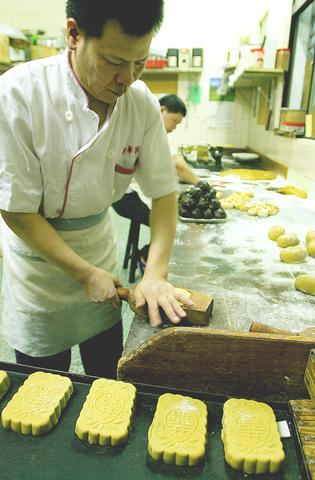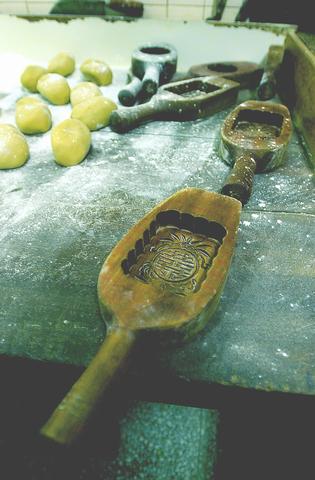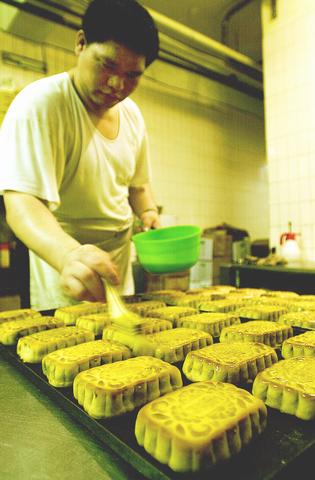In Taiwan, many kinds of food still have strong local associations, either with a family or a geographical region. This is particularly true of traditional Taiwanese-style cakes, and people will often tell you to buy certain types of cakes only at a particular store that is "famous" for it. In the end it all boils down to jealously guarded secret recipes.
Because of these strong associations, local cakes are particularly suitable as gifts. For Taiwanese traveling around the island, it is common practice to bring back some local specialties for friends and colleagues, and the giving of traditional cakes also forms an important part of engagements, marriages and visiting friends.

PHOTO: CHEN CHENG-CHANG, TAIPEI TIMES
For someone approaching a Chinese bakery for the first time, the offerings might be bewildering. Quite apart from which, Taiwanese "cakes" are not all sweet, and you might be surprised to find yourself biting into a crispy shell to find it filled with pork floss or ground meat.

PHOTO: CHEN CHENG-CHANG, TAIPEI TIMES
Chuchien Cake (竹塹餅) is a good example of how different a traditional Taiwanese cakes can be from Western-style cakes. Chuchien Cake is a specialty of Hsinchu (新竹), and is particularly associated with Hsin Fu Chen (新復珍商行有限公司), a bakery with a 104-year history.
Wu Hung-yi (吳紘一), the fourth generation owner who took over the store six years ago, said, "My great-grandmother started this shop a century ago. At the time she was making tzongtze (粽子) -- sticky rice wrapped in bamboo leaves -- next to the City God temple. She came out with the idea to using the meat and other ingredients used in making tzongtze and putting them into a pasty." The crispy pastry crust stuffed with shallots, sesame seeds, pork and candied winter melon has established itself as a regional specialty.

PHOTO: CHEN CHENG-CHANG, TAIPEI TIMES
For a mixture of sweet and savory, green bean cakes by such well-known establishments as the Lee Hu Bakery (李鵠糕餅店), located in Keelung's (基隆) night market district, are definitely worth a try. Green bean cakes come in many shapes and sizes, the most common being that of a slightly out of shape Ping-Pong ball. Green bean cakes, called lutou-sa (綠豆沙餅) are filled with a mixture of minced green beans and minced pork.
Lee Yi-tsong (李儀宗), the third generation owner of this venerable shop said, "usually one catty of flour mixed with 50g of oil can make 120 small cakes. The secret is to make 500 cakes with that amount of material so that the shell is very thin and crisp."
Lutou-kao (綠豆糕), another type of pastry with a green bean filling has a totally different appearance and taste. Yu Chen Chai (玉珍齋食品有限公司), a pastry shop based in Lukang (
Yu Chen Chai's cakes are based on recipes from Ching Dynasty Quanzhou (泉州), Fukian Province (福建) and now incorporate Japanese methods of baking. So famous have they become that many counterfeit products can also be found on the market.
Although steeped in tradition, Yu Chen Chai is not against innovation, and its newest cake is called Hsiao-tao cake (小陶餅), named after the popular TV variety program host -- Tao Ching-ying (陶晶瑩). Huang Yi-cheng (黃一誠) the manager of Yu Chen Chai explained that both he and his wife are both the fans of Tao, so they wanted to invent a new cake to show their appreciation for her. The Hsiao-tao cake is a bite-sized stuffed pastry with a flowerlike design and a light peach fragrance.
Another popular product is the phoenix-eye cake (鳳眼糕), so named because of its shape, long and thin like the eyes of a phoenix. These cakes, which make use of a complex process of allowing sugar to partly ferment, have a slightly wine-like flavor. How the effect is achieved is a closely guarded secret.
Some stores, such as the Yu Hua Hsin Food Company (御華興食品公司) still specialize in traditional wedding cakes and cakes for special occasions like birthdays and temple fairs. Shoutao (
One of the biggest suppliers of traditional-style cakes is Kuo Yuan Ye Foods (郭元益食品), which has many outlets around the island. Much of its success has been due to its shift from traditional to automated production and its reorganization as a modern corporation. Most other traditional bakeries still retain the family organization and some now face problems with a new generation unwilling to take up the yoke of a labor-intensive profession.
Some of Taiwan's best-known bakeries are also its oldest:
Kuo Yuan Ye Foods (郭元益食品) 134 years
456 Wenlin Rd., Shihlin District (
Yu Chen Chai (玉珍齋食品有限公司) 124 years
168 Mintzu Rd., Lukang Township, Changhua County (
Lee Hu Cake Shop (李鵠糕餅店) 119 years
90 Jensan Rd., Keelung City (
Hsin Fu Chen (新復珍商行有限公司) 104 years
6 Peimen St., Hsinchu City (
Yu Hua Hsin Foods Company (御華興食品公司) 55 years
215 Jaoho St., Sungshan District (
tel (02) 2767-2086 or (02) 2763-1967

Growing up in a rural, religious community in western Canada, Kyle McCarthy loved hockey, but once he came out at 19, he quit, convinced being openly gay and an active player was untenable. So the 32-year-old says he is “very surprised” by the runaway success of Heated Rivalry, a Canadian-made series about the romance between two closeted gay players in a sport that has historically made gay men feel unwelcome. Ben Baby, the 43-year-old commissioner of the Toronto Gay Hockey Association (TGHA), calls the success of the show — which has catapulted its young lead actors to stardom -- “shocking,” and says

The 2018 nine-in-one local elections were a wild ride that no one saw coming. Entering that year, the Chinese Nationalist Party (KMT) was demoralized and in disarray — and fearing an existential crisis. By the end of the year, the party was riding high and swept most of the country in a landslide, including toppling the Democratic Progressive Party (DPP) in their Kaohsiung stronghold. Could something like that happen again on the DPP side in this year’s nine-in-one elections? The short answer is not exactly; the conditions were very specific. However, it does illustrate how swiftly every assumption early in an

Inside an ordinary-looking townhouse on a narrow road in central Kaohsiung, Tsai A-li (蔡阿李) raised her three children alone for 15 years. As far as the children knew, their father was away working in the US. They were kept in the dark for as long as possible by their mother, for the truth was perhaps too sad and unjust for their young minds to bear. The family home of White Terror victim Ko Chi-hua (柯旗化) is now open to the public. Admission is free and it is just a short walk from the Kaohsiung train station. Walk two blocks south along Jhongshan

Francis William White, an Englishman who late in the 1860s served as Commissioner of the Imperial Customs Service in Tainan, published the tale of a jaunt he took one winter in 1868: A visit to the interior of south Formosa (1870). White’s journey took him into the mountains, where he mused on the difficult terrain and the ease with which his little group could be ambushed in the crags and dense vegetation. At one point he stays at the house of a local near a stream on the border of indigenous territory: “Their matchlocks, which were kept in excellent order,